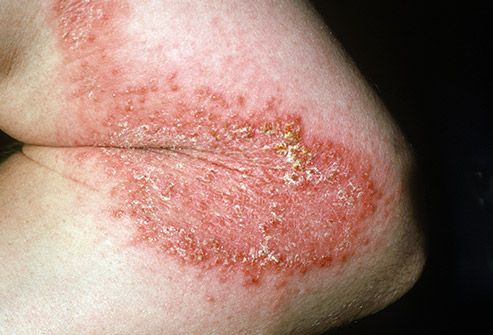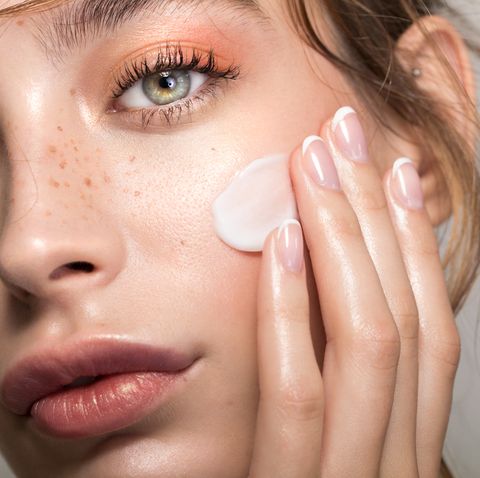Dermatologists have begun to notice skin manifestations possibly associated with COVID-19. While more research is needed, early reports note red rashes, hives, fluid-filled red bumps that look. Seborrheic dermatitis is a common skin condition that causes a red rash, which often appears on the face. The rash may cause the skin to look oily as shown here. The skin can also appear dry and scaly. What can get rid of the redness: Seborrheic dermatitis usually requires treatment to clear. An open sore that does not heal, and may bleed, ooze or crust. The sore might persist for weeks, or appear to heal and then come back. A reddish patch or irritated area, on the face, chest, shoulder, arm or leg that may crust, itch, hurt or cause no discomfort. A shiny bump or nodule that is pearly or clear, pink, red or white. Red round patch on face that comes and goes in same spot HeartInTheCity. Hi, I am 27 years old, with fair skin, and currently 35 weeks pregnant. Over the last 2. Seborrheic dermatitis is a common skin condition that causes a red rash, which often appears on the face. The rash may cause the skin to look oily as shown here. The skin can also appear dry.
Physical Symptoms
Fact Checked
by Wendy M Yoder, Ph.D. and Micah Abraham, BSc
Last updated October 10, 2020
Anxiety is essentially uncontrollable stress, and stress has a known effect on your organs. Your skin is the largest organ in your body, so it's only natural that some people develop skin problems as a result of their anxiety.
Anxiety-produced skin issues are a fairly common symptom, and many people find that their anxiety causes them to develop red and pink blotches on their skin that occasionally itch or burn.

Your Other Anxiety Symptoms
One of the easiest ways to tell if your red blotches are from anxiety is if they tend to pop up when you're experiencing other anxiety symptoms. Red blotches are almost never the only sign that you're stressed.

Likely Causes of Red Blotches From Anxiety
Skin reactions are often the first sign of illness and are associated with some very serious physical ailments. We're told at a young age to be wary of any rashes or red bumps because they may be a sign of:
- Chicken Pox
- Measles
- Mumps
- Allergic Reactions

As we get older, we're told to watch out for changes in skin health because it may be a sign that something is wrong. It may very well be - that's why if you're concerned, you should see a doctor to find out if the rash is a sign of something more. Only a doctor can diagnose the cause of your red blotches.

But the reality of visible skin rashes and ailments is that sometimes they're caused by nothing at all. Your skin can react to all sorts of chemicals, hormones - even temperature. Some people get very severe looking rashes without ever discovering the reason, only for them to fade away harmlessly.
So while you should always see a doctor to get a complete diagnosis, many red blotches have no serious health cause, and many more are caused by anxiety. Anxiety may cause red blotches in several ways:
Body Heat
One common cause of red blotchy skin from anxiety is an increase in body heat. During times of intense stress and anxiety, your body heat rises, and this releases a chemical inside of your body known as histamine - the same immune system chemical that is released during an allergic reaction. As histamine rises to the surface, your body creates hives, which often manifest as itchy, red blotches on the skin.
Body heat-related hives may cause a rash anywhere on your body, but the most common areas are the:
- Neck
- Chest
- Face
- Arms
- Belly
Sweat
Anxiety also causes sweating. Sweating can lead to the same release of histamine, and lead to a similar reaction as an increase in body heat. But it can also result in another harmless skin rash known as miliaria (not to be confused with malaria). Miliaria is a simple sweat rash that can affect many people that suffer from serious anxiety attacks.
Irritated Skin Conditions
Those that already have skin conditions may find that their skin conditions become irritated as a result of anxiety. For example, those that have had chicken pox in the past may be more prone to shingles outbreaks. Chickenpox is related to the herpes virus, and like herpes, it never truly leaves your body. During times of intense stress, the virus becomes more prone to activation, and it may rise to the surface and lead to a very itchy and painful outbreak, known as shingles.
Several skin conditions are known to be activated during times of stress. While it's less common for these skin conditions to affect the chest and neck area, they may still become red blotches when you're experiencing intense anxiety.
Unknown Causes
Finally, the cause of your red blotches may be related to your anxiety in ways that are still unclear. Skin often goes through unusual and unexplainable reactions. You may develop red blotches simply as a result of the stress your body goes under during anxiety attacks.
However, if you appear to get these red blotches every time you have anxiety, it's most likely that you're experiencing an outbreak of hives.
How to Cure These Red Blotches
Whether or not you can stop your red blotches depends on their cause. If your anxiety has irritated some type of skin condition - like shingles - then you simply have to wait until it goes away naturally, or treat the underlying virus that caused the reaction.
But if your red blotches are caused by histamine, then the solution becomes a bit easier.
Red Patch On Face That Comes And Goes Wrong
Short Term Anxiety Control
Red Rash On Baby Face Comes And Goes
In many cases, the histamine release is temporary and will reduce itself by the time you've controlled your anxiety. If you are experiencing a serious anxiety attack, try the following:
- Slowed Breathing Many anxiety symptoms come from breathing too quickly or too full. An anxiety attack can make you feel like you're not getting a deep breath, and the tendency to over-breathe makes your anxiety symptoms worse. A good way to control them is to slow your breathing down so that your body can regain its carbon dioxide balance. Deep breathing exercises may also be useful.
- Distract Your Senses Try to locate a healthy distraction. If you have a friend you can call, call them up and talk to them on the phone. These types of activities take you out of your head so that you focus less on the way you feel and more on the conversation (or any healthy distraction, such as listening to a comedy podcast, reading, or engaging in art). Doing so tends to calm the nerves and lead to less anxiety.
- Encourage Yourself Often when people have red blotches they fear the embarrassment. Unfortunately, that fear just causes further anxiety. Your ability to simply say to yourself 'whatever, I don't care about these blotches' and go about your day anyway will decrease that added stress that comes from trying to hide the blotches and worrying about the fear.
These aren't complex strategies mind you, but anxiety reduction isn't about some complex strategy. You can't cure anxiety right away. These are simply tools to help you calm down, and when you feel calm, your blotches should fade or go away completely provided the underlying cause is related to anxiety.
Antihistamines
If you can't seem to calm down or the blotches don't fade right away, you can also consider antihistamines. Several over the counter and prescription medications can reduce the frequency of allergic reactions. Talk to your doctor about whether or not these medications are right for you, but when your hives are too severe to control, these fast-acting antihistamines should be able to help.
Long Term Anxiety Solutions
Finally, you'll still need to address your anxiety if you want your blotches to go away completely. You simply cannot stop these blotches from coming back if you allow your body to try to fight off all of that stress.
There are several treatments for anxiety that work in the long term. It starts with lifestyle changes and trying to decrease stress around you as must as possible. You can also consider therapy, which is well studied and proven effective at teaching you to manage your anxiety, as well as medications and several self-help options.
Few people with anxiety seek an effective treatment. But if you’re willing to commit to one, both your anxiety and your red blotches should be more easily managed.
🍪 Pssst, we have Cookies!
We use Cookies to give you the best online experience. More information can be found here. By continuing you accept the use of Cookies in accordance with our Cookie Policy.

Comments are closed.